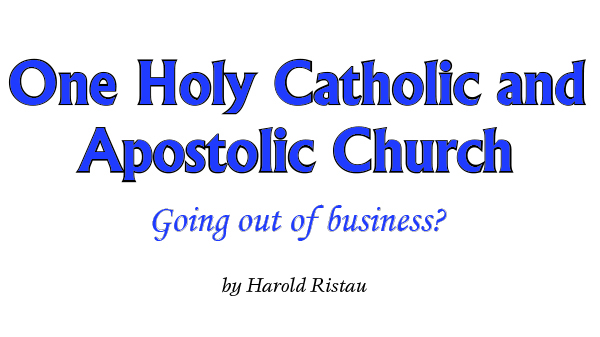One Holy Catholic and Apostolic Church: Going Out of Business?

by Harold Ristau
 With the decline of people in the pew, I have increasingly noticed in the smaller congregations that I visit a more “selective” passing of the offering plate along the pews after the sermon. Instead of passing it from one lap to the next, I have witnessed ushers only targeting those that they recognize as givers, while trying not to disturb those that they believe are unlikely to place something into the plate: either because they are children, the spouse of a giver, they give electronically, are a first time visitor, or for some other reason.
With the decline of people in the pew, I have increasingly noticed in the smaller congregations that I visit a more “selective” passing of the offering plate along the pews after the sermon. Instead of passing it from one lap to the next, I have witnessed ushers only targeting those that they recognize as givers, while trying not to disturb those that they believe are unlikely to place something into the plate: either because they are children, the spouse of a giver, they give electronically, are a first time visitor, or for some other reason.
This kind of practice may make sense if we see the offering plate as a “collection plate,” as many protestants do. For many, the intent of passing the plate, bag, or bucket around the pews, chairs or bleachers is to collect money from the people who, best case scenario, are so grateful for the sermon that they naturally want to ensure that this preaching continues—like opting to give money to your favourite charity. But the passing of the offering plate (notice that I didn’t say “collection plate”) is better viewed as a wonderful liturgical act rich with meaning, than as an opportunity to get money from people.
Giving God His Own
In the Old Testament, while the offerings were used to support the priests, Levites and the poor, their primary purpose was as a sign that acknowledged all good things came from God. It is particularly appropriate for us to have the offering in our services take place after hearing His Gospel proclaimed in the sermon. In some sense, it is a symbol of us giving back to God out of gratitude for what He has given to us. After all, nothing we own belongs to us. It is all God’s and just “on loan” to us. We sing “We give thee but thine own, Whate’er these gifts may be; All that we have is Thine alone, A Trust, O Lord, from Thee” (LSB 781).
In other words, God doesn’t need our money! It’s already His—all of it. We actually give to a church that doesn’t need it. Instead He desires that we give, not because He benefits from it, but because we do. In that sense, you could say the offering plate is a worthwhile act to pass to each individual, even if it comes back empty. It symbolizes us putting our very selves into the plate, and no amount of money that we give can do the image justice. By contrast, the direct deposit route—where believers ensure that the pre-authorized “tithe” is automatically shaved off the monthly work cheque—can sometimes be misconstrued as if we are paying our “membership fees” to the church club.
I recall as a pastor in an inner-city church, how some of the attendees who struggled with mental health issues and financial poverty would sometimes place household objects in the offering plate, such as old jewellery. Although it was hard not to snicker, these guests offered a very good illustration of the point. When the widow brings her two pennies, which are of very little practical good (what good can two pennies do in the operation of the Temple!), Jesus praises her for her sincerity, innocence, and humility. She gave one hundred per cent of what she had. She gave herself back to God. So the question isn’t about what amount of money one is willing to give up, but who has faith and who doesn’t.
The offering plate doesn’t “collect” stuff from us that God doesn’t already have. Or, if it does, it does so in this sense: it “offers” back to God the only thing that He doesn’t have but wishes to possess: our sin. “The sacrifices of God are a broken spirit; a broken and contrite heart, O God, you will not despise” (Psalm 51:17). This is why in LSB setting three, after hearing the sermon, we sing Psalm 51 as the “Offertory” (“Create in me a clean heart, O God”)—before we pass the plates. We give Him ourselves in response to Him giving us Himself. What a surprising but blessed exchange!
The Church is Not a Business
When we understand the purpose of the offering in this biblical manner, we find ourselves repenting of viewing His church as a corporation, business, or even bank, in which God functions as the CEO. A lot of Christians go into panic mode when they look at their church’s “financial situation.” When there is not a lot of money in the bank, church members don’t like to “dip into their savings” and feel the need instead to “save up for a rainy day.” I believe that every Christian knows that this attitude expresses a lack of faith, although we try to convince ourselves that to think otherwise is irresponsible. After all, the world doesn’t work that way. What kind of company doesn’t save up?
The answer is God’s! The church is in no other business than giving, by the proclamation of the Gospel of Jesus’ death for us on the cross. And an empty bank account means that the congregation is doing what Jesus wants them to do: supporting the pastor and his family, spreading the Gospel through missions, and feeding the poor. Financially stable congregations can sin in the same way, when they believe that their financial health can be attributed to their great planning as opposed to God’s grace. For whatever does not proceed from faith is sin (Romans 14:23).
The church is in no other business than giving, by the proclamation of the Gospel of Jesus’ death for us on the cross.
Our obsession with saving can often arise from simply not trusting. And saving is definitely not from faith when God says spend! Thus, God loves a cheerful giver (2 Corinthians 9:7). In a sense, to hold back the financial offerings given to the church by believers with the intent to do certain things like supporting clergy salaries, outreach, and good works in the neighbourhood and around the world, is a sin against the seventh commandment. Yes, stealing! The Holy Spirit moves people to give to the church for certain clear purposes laid out in Holy Scriptures; by not using it in those ways we are misusing that which has been entrusted to us by God through them.
Voters assemblies could argue that it is their intent to eventually use the funds in those ways. But doesn’t the parable of the barns have something to say here? And related to that, whatever happened to faith and trusting God? Even if our church should shut down someday, wouldn’t we want to know that we had never stopped following God’s will? His “hidden will” may make us uncomfortable since we have no control over it, and it may not match our own. For the sceptic who assumes that a zero balance in the church bank account is a sign of bad stewardship, let’s pretend that on Judgement Day the topic comes up with God. If He were to challenge us by saying something like, “Why didn’t you put my money in the bank in order to save it for that rainy day?” we could say, “Lord we were just doing what you asked.” Do you really think He would accuse us of trusting Him too much or chastising our generousness?
God has a Plan
Our faith-driven decision to “spend all the church’s money” might look foolish and irresponsible to the world—as foolish and irresponsible as the innocent Son of Man volunteering to die on a cross as a criminal. But even if our local church should close some day, we can even rejoice in the midst of that (1 Thessalonians 5:18)—for perhaps, in some strange way, even that may be in keeping with God’s Will and part of His larger plan of salvation for the world as He prepares us for His Second Coming. As Dietrich Bonhoeffer once wrote: “It is not we who build. Christ builds the church. No man builds the church but Christ alone. Whoever is minded to build the church is surely well on the way to destroying it; for he will build a temple to idols without wishing or knowing it. We must confess. He builds. We must proclaim—He builds. We must pray to Him—that He may build.”
Bonhoeffer continues: “We do not know His plans. We cannot see whether He is building or pulling down. It may be that the times which by human standards are times of collapse are for Him the great times of construction. It may be that the times which from a human point of view are great times for the church are times when it is pulled down.”
We know God’s will as revealed in the Holy Scriptures—how to live and believe rightly—but we do not know all His plans. Clearly, His will is that we live by faith, tossing all those things which we believe we need and cannot live without (i.e. idols) at the foot of His cross, and entrusting ourselves and our Church into His wounded yet powerful hands. After all, the Church that will never go broke, and is as glorious as it could ever be, is the one that awaits all the elect, in the place “where neither moth nor rust destroy” (Matthew 6:20).
The mission of all of our local churches is to continue to build and support that eternal Church. And when our efforts are focused there, driven by faith instead of doubt, in repentance for all dependence on our human efforts towards ensuring “success,” then the result will never disappoint—even if that includes poverty or even the closure of some buildings. It may be hard for human reason to accept, but believe it or not, God loves your church more than you do. And He can actually do something about the crises in which we find ourselves. But usually His doing involves us giving: giving our wisdom, intelligence, finances, and very selves to Him, to do with them as He knows best—for you, for me, and for His holy Church that stretches into eternity.
———————
Rev. Dr. Harold Ristau is Assistant Professor of Theology at Concordia Lutheran Theological Seminary in St. Catharines, Ontario.





